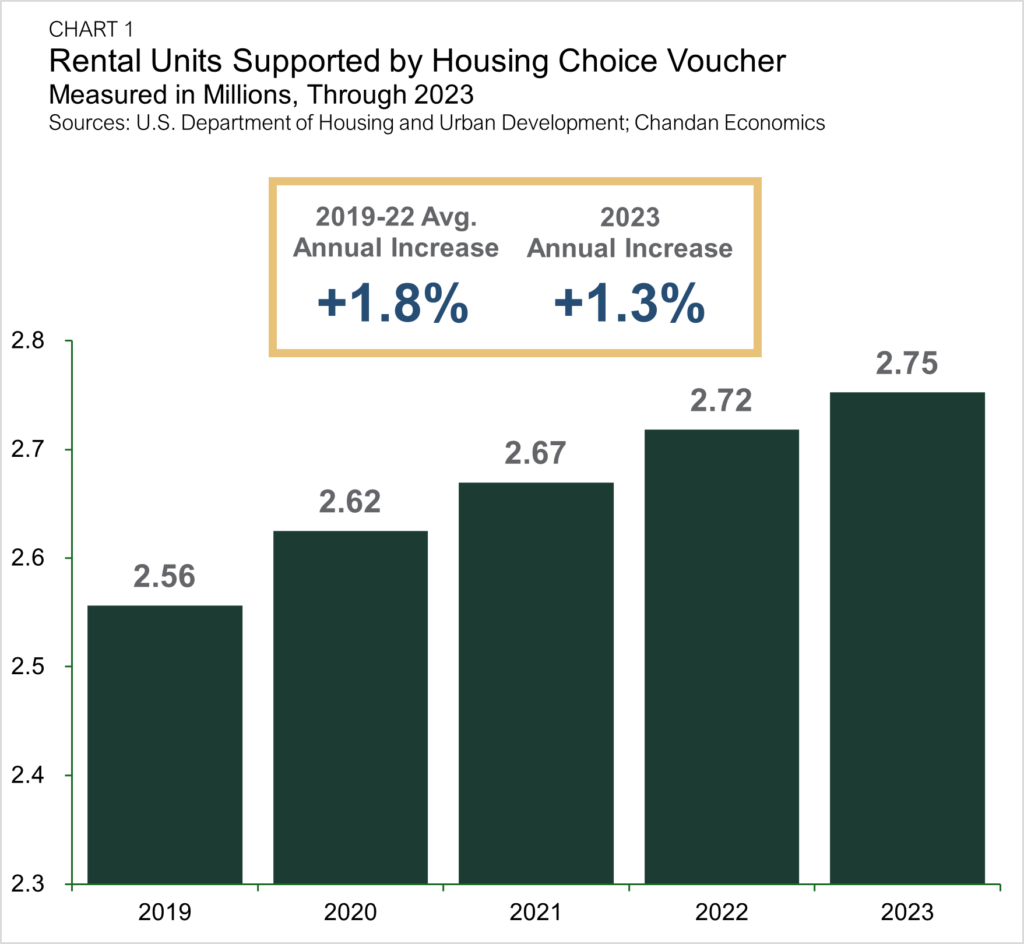Rare Cross-Aisle Consensus Backs Housing Choice Vouchers

- Republicans, Democrats, and private industry groups all have signaled broad support for the Housing Choice Voucher (HCV) program, increasing the likelihood of further expansions.
- HCV, which issued vouchers to nearly 2.8 million rental units in 2023, supports the most affordable housing units of any Federal program.
- Recent rule changes have made the program more competitive and efficient, and new proposed legislation seeks to make additional improvements.
In Washington, D.C., the Section 8 Housing Choice Voucher (HCV) program is championed by Republicans and Democrats alike, making it a rare meeting ground for consensus.
In January 2023, U.S. Senator Sean Coons introduced the Choice in Affordable Housing Act, which has since gained support from members of Congress from both parties. If passed, the legislation would increase private-sector participation in the HCV program by updating the rent-setting methodology, reducing inspection delays, and modernizing the HUD’s evaluation of public housing agencies, among other improvements. The proposed legislation is under consideration at a time when landlords have been leaving the HCV program due to frustrations with how it operates.
HCV Program Gains Broad Support
President Biden’s 2025 budget proposal calls for an additional $2.5 billion of discretionary funding for HUD above the levels enacted in 2023, a sign of what his administration’s legislative priorities could be in a potential second term. Several major real estate industry groups, including the National Multifamily Housing Council (NMHC), the National Association of Home Builders (NAHB), and the National Apartment Association, recently wrote to elected officials to applaud the proposed increase of 130,000 additional vouchers included in the 2025 Federal budget.
If Republicans were to regain legislative control, the HCV program may also be significantly expanded. The Republican Study Committee’s FY 2025 Budget Proposal provides a directional roadmap to how the party would update affordable housing programs. This proposal calls for combining and re-purposing current Federal subsidies for programs, such as the Low-Income Housing Tax Credit (LIHTC) and Project-Based Rental Assistance (PBRA), to increase funding for the HCV program.
Size and Scope
The HCV program supports the largest number of units of any federally directed affordable housing program. In 2023, nearly 2.8 million rental units received vouchers, an increase of about 34,000 units from the prior year.

The vouchers are primarily a form of tenant-based housing assistance in which renters spend 30% of their adjusted monthly income on rent, and the balance is covered through a subsidy.
The program’s supporters point to a few key features that make its design particularly effective and attractive, including voucher recipients’ ability to transfer their subsidy to a new unit, allowing for increased mobility and economic opportunity. The HCV program has gained widespread bipartisan support because its implementation does not violate free-market principles.
Recent modernizations have helped to make the program more efficient and competitive, including rule changes to the Housing Opportunity Through Modernization Act of 2016 and the expansion of its Small Area Fair Market Rents, which gives the HCV program the ability to monitor local market conditions more closely, improving usability and utility. By extension, tenants can more easily use vouchers to access higher-rent neighborhoods with better-performing schools and greater economic opportunities.
As we approach the 2024 general election, the HCV program is uniquely positioned with a broad coalition of support across the political aisle and across the public-private divide. Regardless of which political party controls the White House and Congress in 2025, the HCV program is in line for continued expansion in the years ahead.
For more information about the HCV Program and additional affordable housing insights and analysis, read Arbor’s Affordable Housing Trends Report Spring 2024, developed in partnership with Chandan Economics.
Interested in the multifamily real estate investment market? Contact Arbor today to learn about our array of multifamily, single-family rental, and affordable housing financing options or view our multifamily articles and research reports.

